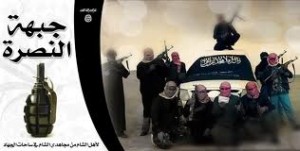 It was not the supposed imminent collapse of the Syrian regime that dominated the recent meeting of the Friends of Syria in Marrakech but the thorny subject of al-Nusra, one of the armed resistance groups operating in the country, which the US has just classified as a “foreign terrorist organisation”. The chairman of the Syrian National Coalition called for the US to reconsider its decision; the Muslim Brotherhood’s Mohamad Tayfur condemned it as wrong and hastily made. Many other statements of support for al-Nusra followed, most notably from non-Islamist members of the coalition.
It was not the supposed imminent collapse of the Syrian regime that dominated the recent meeting of the Friends of Syria in Marrakech but the thorny subject of al-Nusra, one of the armed resistance groups operating in the country, which the US has just classified as a “foreign terrorist organisation”. The chairman of the Syrian National Coalition called for the US to reconsider its decision; the Muslim Brotherhood’s Mohamad Tayfur condemned it as wrong and hastily made. Many other statements of support for al-Nusra followed, most notably from non-Islamist members of the coalition.
It is no secret that the entry of the armed opposition into the city of Aleppo was co-ordinated by al-Nusra and the al-Tawhid brigade, part of the Syrian Free Army, and that al-Nusra remains an effective fighting force. But who are they? Though the al-Tawhid brigade is Islamist, its members are exclusively Syrian. Al-Nusra’s fighters, on the other hand, are mainly foreign, and its emir (leader) is appointed from outside Syria. What, then, accounts for the support by so many of those attending the Friends of Syria conference for an organisation the US believes to be an al-Qaida front?
From the moment al-Nusra issued its first statement in December 2011, after a suicide bombing in Damascus, both Syria’s armed opposition and the opposition in exile expressed concern about this mysterious new organisation. The Syrian National Council claimed al-Nusra had been formed by Syrian intelligence to tarnish the image of the Free Army. Syrian human rights defenders spoke out, too, warning of al-Qaida links. The organisation, many feared, was fast becoming the most attractive group for foreign jihadists in a sectarian war against Alawites, Shias and secular Syrians.
In January, the National Co-ordination Committee asked Turkey to stop letting foreign fighters enter Syria. In February, the Syrian National Council issued a statement rejecting “all attempts to exploit the uprising by foreign jihadi and sectarian fighters”. Why the apparent shift of opinion within Syria’s opposition groups?
Al-Nusra has indiscriminately targeted non-Sunni people, and all parts of the state. In this military strategy one can see a point of convergence between the Muslim Brotherhood, the salafists, and al-Nusra: all three groups reject the idea that Assad’s regime and the apparatus of the state are distinct. The reasons are historical: since a 1980 decree sentencing any member of the Muslim Brotherhood to death, there has been no Brotherhood presence in the state. Because of this, the Syrian Islamist movement has long considered the state as inherently alien. This view is not held by all Syrians, however, almost eight million of whom work for the state in various capacities.
The Muslim Brotherhood targeted the military institutions as if they were Assad’s own army. Similarly, al-Nusra considers them to be the Alawite army. This intersection of views explains the lack of support shown by minorities and secular Syrians for the armed opposition groups, which were dominated by Sunni Islamists. The role of secular democrats was marginalised, and the emphasis placed on funding armed action.
Various interested parties have supported the armed opposition. The Gulf states consider Islamisation as a protection against genuine democracy in Syria, which would pose a threat to their own regimes. The Turkish government considers Islamisation necessary for the isolation of the Syrian Kurds. The west, meanwhile, was happy to simply monitor the scene, hoping armed opposition would result in the overthrow of the Syrian regime.
The Syrian National Council, too, co-operated both financially and militarily with al-Nusra, as did the leaders of various armed groups in northern Syria. Despite all the promises made to the US delegation in Tunisia to break with them, co-ordination continued on the ground.
This is why the US deputy secretary of state found himself isolated in Marrakech when he classified al-Nusra as a terrorist organisation. The British and French remained silent, as did the EU, this year’s Nobel peace prize winner. This was met with horror by many Syrians, the vast majority of whom reject al-Nusra. When the Syrian army attacks al-Nusra it is not as the suppressor of the popular movement, but the guarantor of the unity of Syria’s diverse society. It is the alliance between foreign jihadists and some Syrians that risks tearing the country apart, leading to religious extremism, long-term sectarian war, and the persecution of minorities and various civilian groups.
Support for al-Nusra can be seen as both a symptom of the drunkenness of anticipated military victory, prematurely proclaimed, and an attempt to further undermine the political solution the UN still seeks. What happens as a result will not be decided by a conference in Marrakech, but on the ground. One thing is certain: the fight for Syria will last a long time, and will not end with the fall of the regime.
Guardian.co.uk.

Leave a Reply
You must be logged in to post a comment.